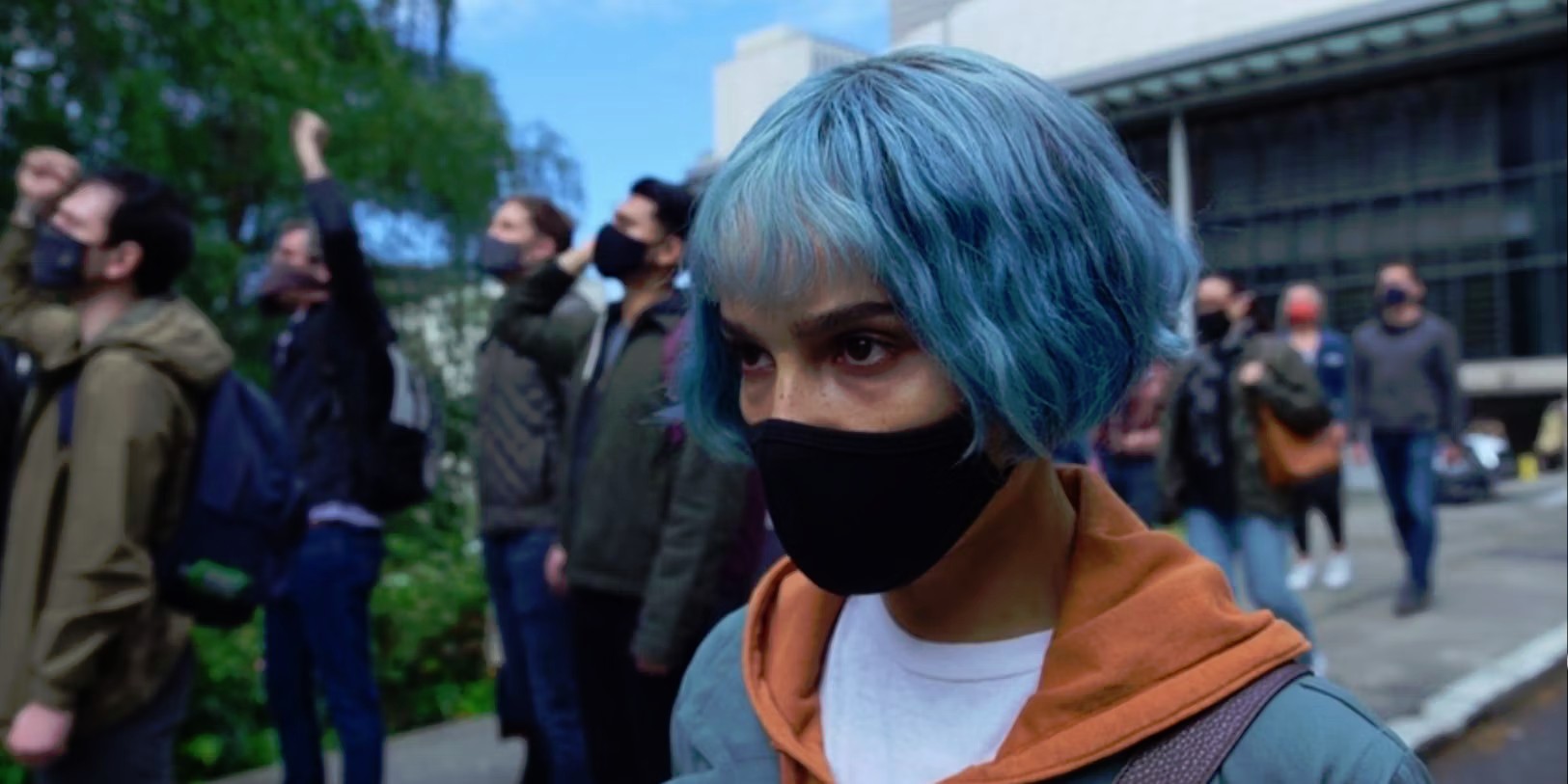 ★★★
★★★
“Blue is the warmest colour”
Angela Childs (Kravitz) is a computer programmer who fixes bugs on the new smart speaker “Kimi”. It’s a perfect job, as she suffers from agoraphobia but can work at home, interrupted only by occasional sex with friendly neighbour (Bowers). When she finds a recording she thinks is a sexual assault on a woman, she contacts her superiors, who don’t seem eager to contact the FBI. Angela experienced an assault in the past herself (causing her agoraphobia), and goes directly to an executive at the central office, Natalie Chowdhury (Wilson). What she does not know is, that her company is about to go public and the woman she heard, the lover of its CEO, is already dead. Not only are the authorities uninformed, her own company has sent hired killers on her trail, with state-of-the-art tech to locate Angela. She must leave her home, agoraphobia or not.
This movie got my initial attention when I saw the poster with a blue-haired Zoë Kravitz and the word “Kimi” over it – I originally thought that would be the name of her character. I don’t know if this movie was actually shown in cinema in the US (Jim: no, it went straight to streaming), here in Germany it ran in a few cinemas for about 2 weeks. In America it can be seen on HBO Max; here in Germany it is available on Amazon-Prime. This is good as there is – unlike the US – no German DVD release. I worried this would be another one of those “woke” movies: it’s not. Written by first-class screenwriter David Koepp (Jurassic Park, Mission Impossible“, Spider-Man (2002), Indiana Jones 4) and directed by Steven Soderbergh, this movie proves to be very effective.
We see Kravitz living quite comfortably in her large flat and though she can only see her mother online and isn’t able to go downstairs to meet her friend for some fast-food in front of the door, she isn’t missing much. She more or less has everything she needs at home. In that respect the movie perfectly mirrors the situation many of us around the globe experienced during the lockdowns, when we were asked to work from home if we could. Let’s face it, quite a lot of people got used to this kind of situation, and companies could save a lot of money, not needing to have their employees actually in a dedicated working place.
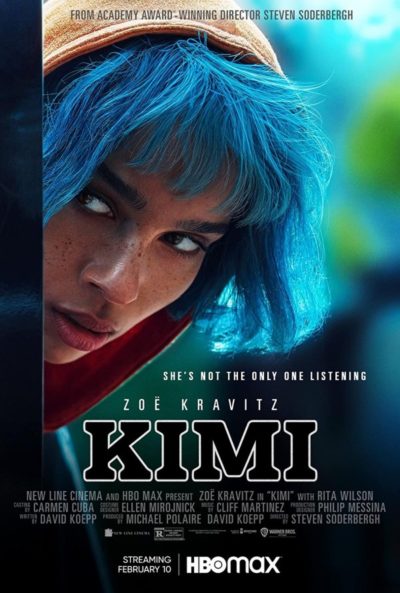 Kimi indirectly discusses this attitude, but also seems to make a clear point that there is a need to leave your own four walls sometimes, because not everything can be handled from your laptop. That said, it’s quite disturbing how much can be done by digital tracking, and this results in a real “woman hunt” through the city, with Angela’s chances rising when she gets rid of her mobile phone. The world outside is frightening through her eyes: some people are out but it’s not too crowded until she gets into a demonstration. Most shocking is the way she is almost kidnapped there by the assassins, in broad daylight. I’d also like to mention the unusual but good and very interesting score by Cliff Martinez, such as when she escapes from the central office.
Kimi indirectly discusses this attitude, but also seems to make a clear point that there is a need to leave your own four walls sometimes, because not everything can be handled from your laptop. That said, it’s quite disturbing how much can be done by digital tracking, and this results in a real “woman hunt” through the city, with Angela’s chances rising when she gets rid of her mobile phone. The world outside is frightening through her eyes: some people are out but it’s not too crowded until she gets into a demonstration. Most shocking is the way she is almost kidnapped there by the assassins, in broad daylight. I’d also like to mention the unusual but good and very interesting score by Cliff Martinez, such as when she escapes from the central office.
It is not until about an hour that Kravitz leaves her apartment. But ultimately her journey leads back home: in the end no one can help, not even a friendly stalker from across the street – only herself. The movie has been from time to time mentioned in comparison with Hitchcock’s Rear Window which I think is a bit too high praise. Other movies such as Blow Out (1981) by Brian de Palma, Enemy of the State (1998) with Will Smith and Gene Hackman, or the recent Netflix thriller The Woman in the Window (2021) with Amy Adams come to mind. The last one especially shares the basic situation of the protagonist with this, though Window is much less successful. Kimi is also part of a long line of what could be called “digital surveillance thrillers”.
David Koepp himself once wrote a similar movie: Panic Room (2002) in which Jodie Foster had to defend herself and her daughter from that location against burglars. But while in Panic Room the main idea was to escape and get help, here there is no more security outside. The authorities can’t (or don’t want to) help, and your employer or company have turned against you. It’s a subject Soderbergh has previously covered in Haywire or Unsane. So, while Koepp and Soderbergh don’t tell an entirely new story here, they have put it on a contemporary level. This works, giving a new coat of paint to the old thriller genre, that has become a bit stale and isn’t seen so often anymore. Modern Hollywood seems more interested in the newest superhero movie or the latest Tom Cruise blockbuster.
Kravitz gives in my opinion a very good performance. I’ve never been a real fan, though she seems to have had a breakthrough as Catwoman in The Batman (2022), opposite Robert Pattinson. Here, I can’t complain: I was convinced the heroine was both agoraphobic and quite stubborn. The other actors here are largely unknown, yet give good, fitting performances, and it all comes together well. There are some nice audio ideas in the movie; for example when Angela puts on her headphones everything becomes quiet. This is the same thing we do on a daily basis: just try to fade out the real world. Kimi seems to be saying that we maybe shouldn’t do this so often. We should go out and involve ourselves, and take a stand for things we care for. That’s not a bad message, I think.
Dir: Stephen Soderbergh
Star: Zoë Kravitz, Byron Bowers, Rita Wilson, Erika Christensen





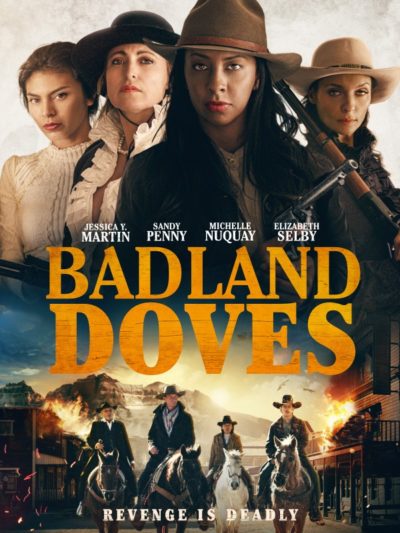 I am contractually obliged to appreciate at least somewhat, any film made here in Arizona. This certainly fits the bill, having been shot at places like the Pioneer Living History Museum, Sitgreaves National Forest and Winters Film Group Studio. However, it is a fairly basic tale of two-pronged revenge, with significant pacing issues. The proceedings only come to life in the last 20 minutes – and barely that. Initially, matters are more than a tad confusing, as we jump about in time and space without apparent notification. But the basic principal is eventually established.
I am contractually obliged to appreciate at least somewhat, any film made here in Arizona. This certainly fits the bill, having been shot at places like the Pioneer Living History Museum, Sitgreaves National Forest and Winters Film Group Studio. However, it is a fairly basic tale of two-pronged revenge, with significant pacing issues. The proceedings only come to life in the last 20 minutes – and barely that. Initially, matters are more than a tad confusing, as we jump about in time and space without apparent notification. But the basic principal is eventually established.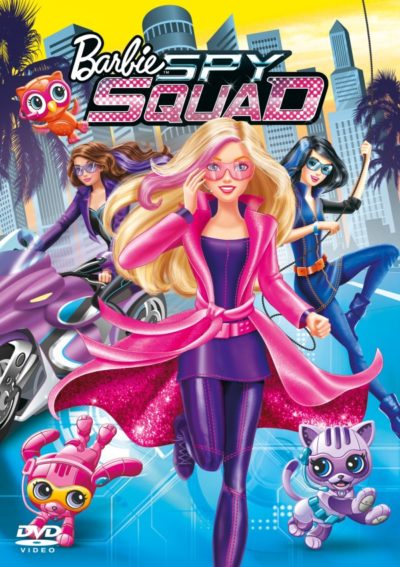 Ah, the things I watch for you people. Safe to say, this probably hit new heights of “I am not the target demographic”, but it’s hard to argue it is outside the remit of the site. To the film’s credit, this is not as bad as I feared it might be. If I had an eight-year-old daughter – such a shame this turned up about 25 years too late! – there would be far worse things to have inflicted on me. Not that I’ll exactly be chasing down any of the other
Ah, the things I watch for you people. Safe to say, this probably hit new heights of “I am not the target demographic”, but it’s hard to argue it is outside the remit of the site. To the film’s credit, this is not as bad as I feared it might be. If I had an eight-year-old daughter – such a shame this turned up about 25 years too late! – there would be far worse things to have inflicted on me. Not that I’ll exactly be chasing down any of the other  I’ve previously talked about – OK, “ranted” may not be inappropriate – the perils of message movies. But I did wonder whether it was the specific content to which I objected. Would I dislike a film so much, if I was on board with its strident message? On the evidence here, I can confidently state: hell, yes. For this is painfully earnest and hard to watch, much though I agree with the environmental topic, that humanity’s use of plastics are threatening the oceans. An alternative needs to be found. By which I mean, I strongly suggest you find an alternative to watching this movie. The poster has clearly strayed in from a far more entertaining offering, and bears little resemblance to what this provides.
I’ve previously talked about – OK, “ranted” may not be inappropriate – the perils of message movies. But I did wonder whether it was the specific content to which I objected. Would I dislike a film so much, if I was on board with its strident message? On the evidence here, I can confidently state: hell, yes. For this is painfully earnest and hard to watch, much though I agree with the environmental topic, that humanity’s use of plastics are threatening the oceans. An alternative needs to be found. By which I mean, I strongly suggest you find an alternative to watching this movie. The poster has clearly strayed in from a far more entertaining offering, and bears little resemblance to what this provides. 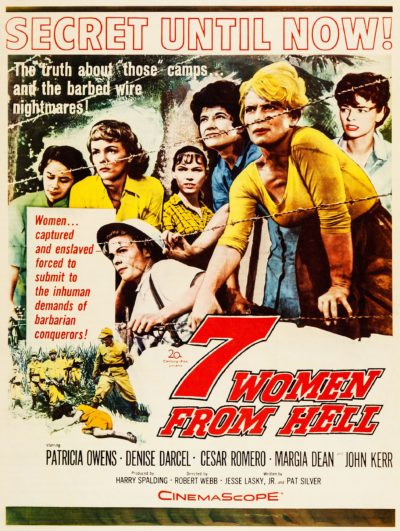 About the only review online I found for this, said it “may be the worst movie released in 1961.” I can only presume the writer of that statement has never seen The Beast of Yucca Flats. Even if I admit its weaknesses, Seven is nowhere near the same league of badness. Indeed, it starts off well, depicting the sudden invasion of Papua New Guinea by Japanese forces in 1942, with “enemy” civilians being herded into interment camps. The ones on the women’s side are a multi-national bunch, including Australian Grace Ingram (Owens), several Americans including Janet Cook (Craig), a German widow Ann Van Laer (Sylvia Daneel), Frenchwoman Claire Oudry (Darcel), and mixed-race nurse Mai-Lu Ferguson (Pilar Seurat).
About the only review online I found for this, said it “may be the worst movie released in 1961.” I can only presume the writer of that statement has never seen The Beast of Yucca Flats. Even if I admit its weaknesses, Seven is nowhere near the same league of badness. Indeed, it starts off well, depicting the sudden invasion of Papua New Guinea by Japanese forces in 1942, with “enemy” civilians being herded into interment camps. The ones on the women’s side are a multi-national bunch, including Australian Grace Ingram (Owens), several Americans including Janet Cook (Craig), a German widow Ann Van Laer (Sylvia Daneel), Frenchwoman Claire Oudry (Darcel), and mixed-race nurse Mai-Lu Ferguson (Pilar Seurat). 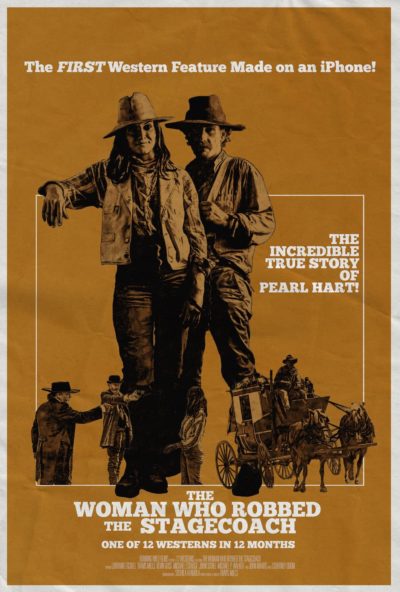 There are a couple of points to note going in. This was one of “12 Westerns in 12 months”, a project run by the director during 2020. It also proudly pronounces itself as the first ever Western feature to be shot entirely on an iPhone. Both of these do lead to limitations. The sheer speed involved obvious has an impact, and I can’t help wondering if a more measured approach would have been better for the end product. As for the iPhone… Well, on the plus side it looked perfectly watchable on my 49″ television, especially the outdoor scenes. However, the indoor sequences seemed almost
There are a couple of points to note going in. This was one of “12 Westerns in 12 months”, a project run by the director during 2020. It also proudly pronounces itself as the first ever Western feature to be shot entirely on an iPhone. Both of these do lead to limitations. The sheer speed involved obvious has an impact, and I can’t help wondering if a more measured approach would have been better for the end product. As for the iPhone… Well, on the plus side it looked perfectly watchable on my 49″ television, especially the outdoor scenes. However, the indoor sequences seemed almost 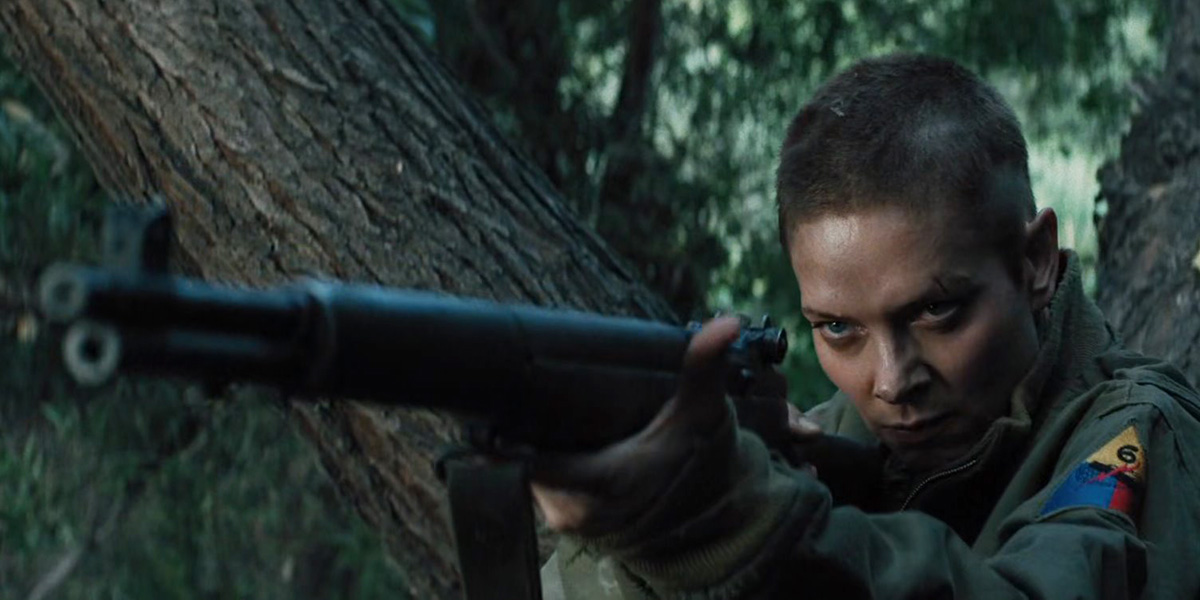 ★★★½
★★★½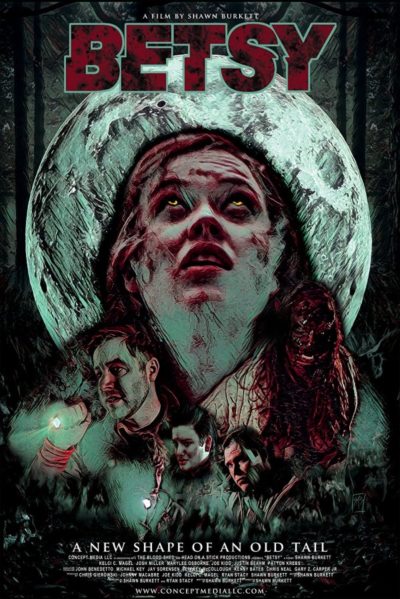 On her way home one night, Betsy (Ryan) is attacked by a mystery assailant and badly injured. While she recovers, she’s traumatized by the events, with nightmares that even her attendance at a support group can’t help. She is also increasingly plagued by violent outbursts against her supportive but increasingly concerned roommate Kayte (Osborne), and physical changes. If you are at all familiar with horror movies, you’ll know the symptoms: Betsy’s attacker was a werewolf, and she’s now in the process of becoming one. This throws a spanner in her growing relationship with Sam (Miller), made worse because he’s a policeman, investigating the recent spate of “animal attack” murders around town.
On her way home one night, Betsy (Ryan) is attacked by a mystery assailant and badly injured. While she recovers, she’s traumatized by the events, with nightmares that even her attendance at a support group can’t help. She is also increasingly plagued by violent outbursts against her supportive but increasingly concerned roommate Kayte (Osborne), and physical changes. If you are at all familiar with horror movies, you’ll know the symptoms: Betsy’s attacker was a werewolf, and she’s now in the process of becoming one. This throws a spanner in her growing relationship with Sam (Miller), made worse because he’s a policeman, investigating the recent spate of “animal attack” murders around town. I’m tempted to leave my review at that. But there’s a famous quote by critic Roger Ebert, going off on Bruce Willis flop, North: “I hated this movie. Hated hated hated hated hated this movie. Hated it. Hated every simpering stupid vacant audience-insulting moment of it. Hated the sensibility that thought anyone would like it. Hated the implied insult to the audience by its belief that anyone would be entertained by it.” I was always impressed, and hoped one day to find a film capable of producing a similar reaction. This is… close. It is, let’s be clear, utterly terrible, with almost no redeeming qualities. Yet it’s either not bad enough, or more likely, too bad to generate such a reaction. That would be giving it more power and credit than this deserves.
I’m tempted to leave my review at that. But there’s a famous quote by critic Roger Ebert, going off on Bruce Willis flop, North: “I hated this movie. Hated hated hated hated hated this movie. Hated it. Hated every simpering stupid vacant audience-insulting moment of it. Hated the sensibility that thought anyone would like it. Hated the implied insult to the audience by its belief that anyone would be entertained by it.” I was always impressed, and hoped one day to find a film capable of producing a similar reaction. This is… close. It is, let’s be clear, utterly terrible, with almost no redeeming qualities. Yet it’s either not bad enough, or more likely, too bad to generate such a reaction. That would be giving it more power and credit than this deserves. 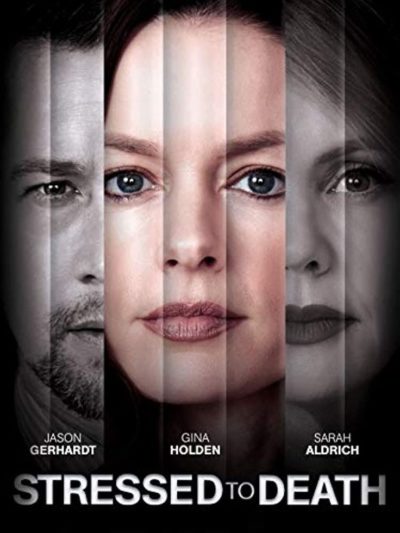 The concept here is intriguing. It’s just the execution – and the script in particular – which is bad. A robbery at a convenience store ends in the death of David, the husband to Victoria Garrett (Aldrich). She blames the paramedic on the scene, former soldier Maggie Hart (Holden), for the loss of her spouse, though the incident hits Maggie equally hard. She quits her job, raising daughter Jane (Blackwell) with her husband, commercial real-estate agent, Jason (Gerhardt). But Victoria hasn’t moved on – in probably the film’s most memorably loopy elements, she feeds her husband’s ashes to a pot-plant she calls David, to which she chats. She’s also clearly a believer in that saying about revenge being served cold.
The concept here is intriguing. It’s just the execution – and the script in particular – which is bad. A robbery at a convenience store ends in the death of David, the husband to Victoria Garrett (Aldrich). She blames the paramedic on the scene, former soldier Maggie Hart (Holden), for the loss of her spouse, though the incident hits Maggie equally hard. She quits her job, raising daughter Jane (Blackwell) with her husband, commercial real-estate agent, Jason (Gerhardt). But Victoria hasn’t moved on – in probably the film’s most memorably loopy elements, she feeds her husband’s ashes to a pot-plant she calls David, to which she chats. She’s also clearly a believer in that saying about revenge being served cold.